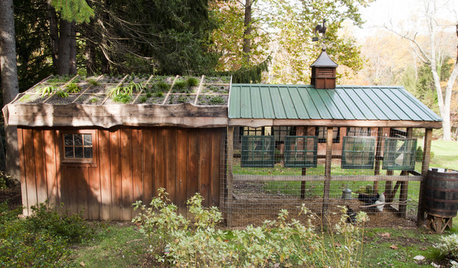chicken lice
riley17
15 years ago
Related Stories

FARM YOUR YARDHouzz Call: Show Us Your One-of-a-Kind Chicken Coops
Do you have a fun or stylish backyard shelter for your feathered friends? Post your pictures and stories in the Comments!
Full Storyhi, I've had chickens for about five years now and i always bought any new additions as babies from a hatchery so there was never a worry about them bringing the older hens lice right? i hope. Anyways, i was wondering if you can see chicken lice and if you can, what do they look like? I was cleaning my coop out last week or so and i have this crazy habit of taking an old vacuum cleaner to my coops walls because i cant stand the dust and cobwebs that build up there. I noticed thousands of these little white bugs that look like white fleas on the walls and so now I'm wondering if my poor little hens have chicken lice? I'd rather not use chemicals on them if i can help it so any info would be helpful. Thanks,
Riley

beeliz
riley17Original Author
Related Professionals
Lyons Landscape Architects & Landscape Designers · Edmond Landscape Contractors · Chesapeake Ranch Estates Landscape Contractors · Holland Landscape Contractors · Kailua Landscape Contractors · Mercedes Landscape Contractors · Mesa Fence Contractors · Downey Fence Contractors · Greentree Fence Contractors · Mill Valley Fence Contractors · Palo Alto Fence Contractors · Wauconda Fence Contractors · Aventura Decks, Patios & Outdoor Enclosures · Fort Worth Decks, Patios & Outdoor Enclosures · Manchester Decks, Patios & Outdoor Enclosuresbeeliz
velvet_sparrow
ginni77
carmen_grower_2007
velvet_sparrow
beeliz
hamsterdampster82_yahoo_com